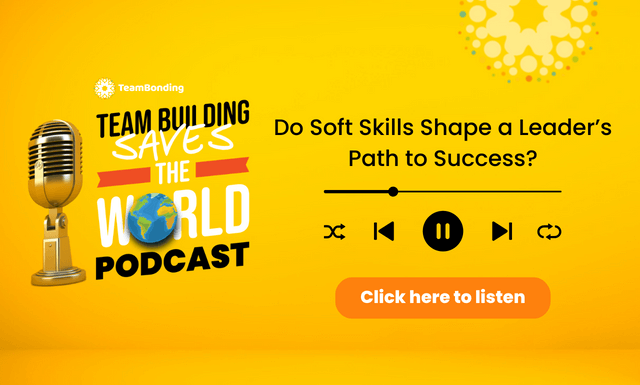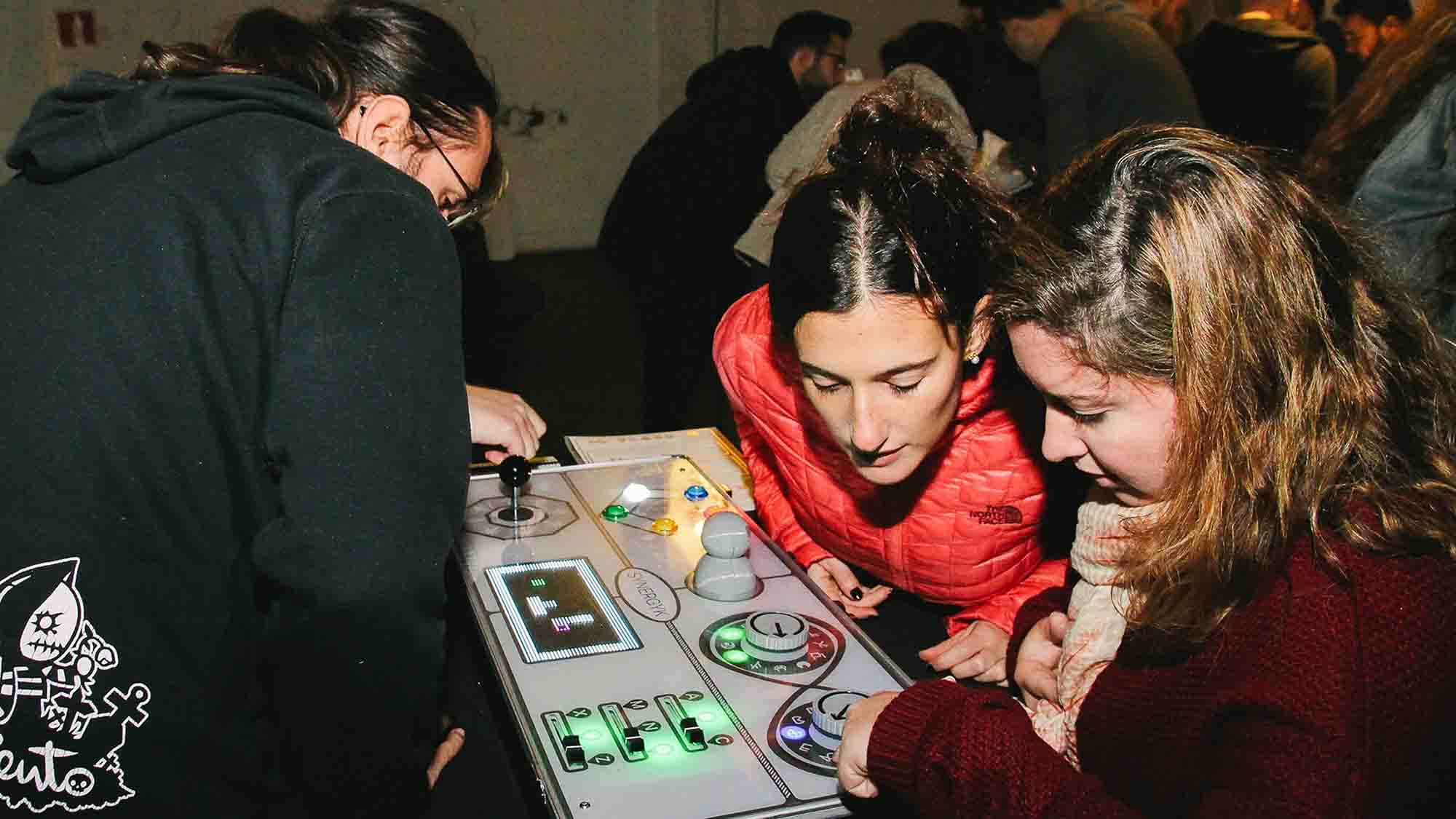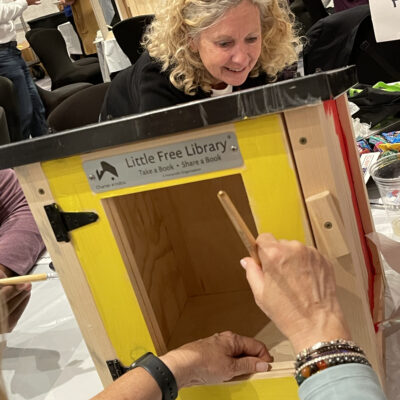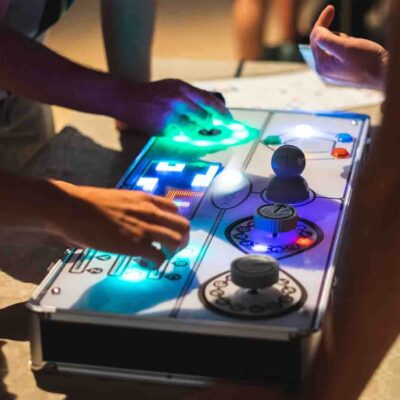How to Develop Soft Skills in the Workplace
You’ve just gone through another marathon hiring process. It’s down to two candidates. On paper, they both seem equally qualified. Educational background? Check. And relevant work experience? Check.
Now what? You can only hire one of them.
That’s where assessing their soft skills, aka “power skills,” comes into play. Let’s dive into developing soft skills are and why they’re essential. We’ll also reveal the top 3 ways you can help your employees on their soft skills development to keep them engaged and inspired.
In our episode of the Team Building Saves the World podcast, “Do Soft Skills Shape a Leader’s Path to Success“, we spoke with leadership expert Scott Asai about the vital significance of soft skill development for leaders and preserving them from the threat of extinction.
Hard Skill vs. Soft Skill Development
The primary difference between soft and hard skills is how your employees acquire them. For instance, soft skills, or human skills, are the individual traits or pillars in our personality that make us who we are. For example, our communication skills or creative thinking abilities develop and evolve. Of course, several others fall under this category.
Types of Soft Skills:
- Creativity
- Empathy
- Leadership qualities
- Time management
- Critical thinking skills
- Flexibility & adaptability
- Public speaking abilities
- Listening skills
- Collaboration
- Strong work ethic
- Confidence
- Exhibits a growth mindset
On the other hand, hard skills, aka “technical skills,” are the ones we develop in educational or vocational settings or those we learn in life.
Types of Hard Skills:
- Statistical analysis
- Proficiency in MS Office
- Foreign language fluency
- Digital security
- Copywriting
- Programming language proficiency (e.g., Perl, Python, etc.)
- Budgeting
- Contract writing
- Marketing
Ideally, you want to see a combination of hard and soft skills in every job applicant (and employee). Unlike hard skills, developing soft skills can be challenging to learn. That’s because not only do your employees need the technical and intellectual capability to perform their job, but they also need to work as part of a diverse team.
Key Soft Skills to Look for in Job Applicants
Soft skill development becomes even more critical for each employee’s success when you have a diverse and inclusive workplace. Creating and maintaining a positive workplace culture is essential for better productivity, positive morale, and employee retention.
Here are the three important soft skills you should look for when interviewing candidates. Hiring candidates who possess these soft skills will help you maintain a more inclusive and positive work environment.
Out-of-The-Box Thinking
Workplace problems often require innovative solutions. When interviewing a job candidate, you’ll want to gauge one particular soft skill–their ability to think outside the box. But how might you go about this?
Here are a few questions or topics you could ask during their interview:
- Tell us about a time you felt stuck on a problem or issue. What did you do to resolve it?
- Propose a hypothetical scenario of your choice (e.g., a real problem your company has faced), and ask the candidate what approach they would take to resolve it.
- Have you ever proposed a unique solution that your manager or colleagues rejected? If so, how did you handle this situation?

Leadership Qualities
Your employees all have a unique combination of soft skills. And some may have more of a predisposition toward leadership qualities than others. What do we mean by leadership qualities, though? Leadership qualities include any combination of the following soft skills:
- Empathetic
- Strong communicator
- Charismatic
- Inspirational
- Encouraging
- Learning agile
When you’re interviewing a viable candidate, consider the following factors to determine if they have what it takes to be a leader in your ranks:
- Assess their past job duties that include public speaking, management, and decision-making skills
- Pose a hypothetical scenario to determine how they might demonstrate leadership qualities (e.g., what would they do to improve an issue with miscommunication in the workplace?).
- Ask them directly if they consider themselves to be a leader in the workplace and why.
Empathy
The ability to step into a customer’s or a colleague’s shoes is a valuable soft skill for any employee. When an employee understands their colleagues’ perspective and experiences, that can have a positive impact on their ability to collaborate, problem-solve, and communicate, in general.
There are several ways you can encourage your team to practice empathy. A corporate charity event, such as Tools for Schools, would allow them to not only improve their collaboration and communication skills, but they’d be doing so for a good cause. Better yet, empathy training can help employees embrace their natural human empathy and bond with their coworkers at the same time.
Helping Employees with Soft Skills Development
Not all of your new hires or current employees will have already developed the right soft skills. Employers should make it an ongoing priority to help employees develop those critical soft skills to be successful in the workplace. Here are several quick steps that you can take toward accomplishing that goal.
Invest in Employee Professional Development
What better way to show your employees that their soft skills are just as essential as their hard skills than to invest in professional development opportunities? These opportunities would allow them to practice and strengthen their soft skills.
One of the best ways to do this is by organizing team-wide soft skill-building activities. For instance, Team Synergy is a collaborative team-building experience that forces your team to work together if they want to make it to the next round. As a result, they’ll learn to recognize their strengths and weaknesses while improving their problem-solving abilities.
Another great option to improve soft skills is Human Skills, our people skills training program! This program combines fun, strategy and practical learning to help you unlock your team’s potential. Using GPS-enabled iPads, participants navigate challenges to reach diverse checkpoints, selecting destinations and routes tailored to explore desired skills in a real-world setting.
Acknowledge and Reward Growth
Who doesn’t like to have their hard work recognized? To show your employees that you value the soft skills they bring to the table, you’ll want to acknowledge and reward them for it. Doing this can incentivize them to continue developing soft skills in the workplace.
Take a look at some of the best ways to reward your employees:
- Plan a paid, company-wide team-building day. Catapult to Success would test their soft skills and reward them with friendly competition as they learn to problem-solve together.
- Host a catered lunch or a dinner out at a local restaurant.
- Consider a reward of additional paid time off.
- Offer gift cards or tickets to a local museum or concert.
Take the Next Step to Building Employee Soft Skills
Not every job candidate will bring the same set of soft skills in the workplace. And that’s a good thing for diversity’s sake. The bottom line is that soft skills are learnable. So, it’s vital to offer your team plenty of soft-skill-building opportunities. Wondering other ways on how to develop soft skills?
TeamBonding team building activities can allow them to practice and improve several soft skills, including collaboration, empathy, communication, and more. When your employees do this, they’ll have a more positive employee, and you’ll be more likely to retain them long-term.
Get more insights in our newsletter:
* every subscription supports charity!
Plays well with these activities.


 Unlock exclusive resources for better teams. Every subscription supports charity!
Unlock exclusive resources for better teams. Every subscription supports charity!
Create Your Free Account
Get exclusive access to new programs from the TeamBonding Lab, save your favorite ideas, and track your upcoming events.
Already have an account? Login










